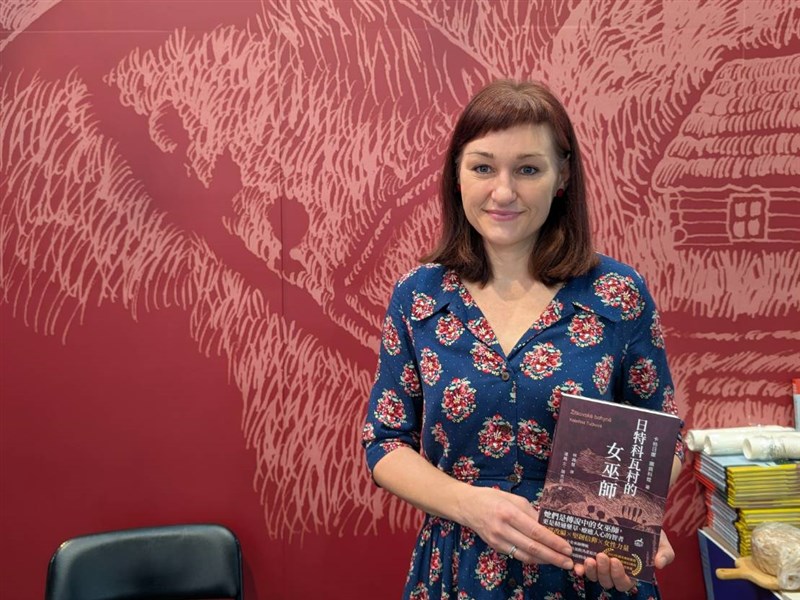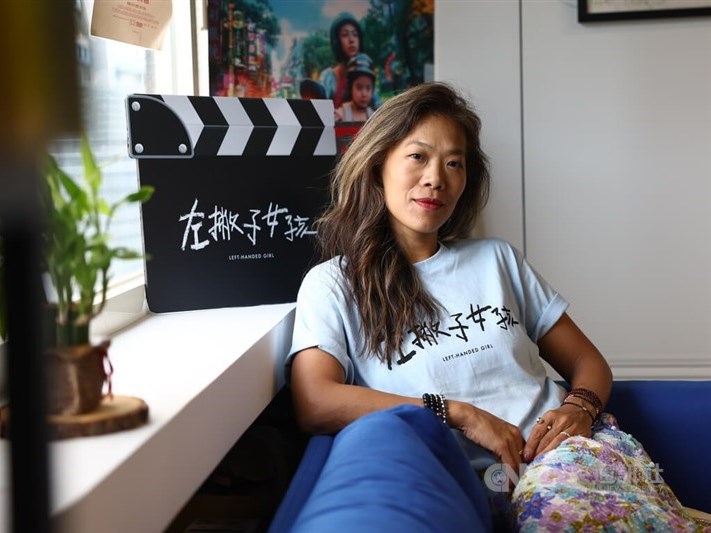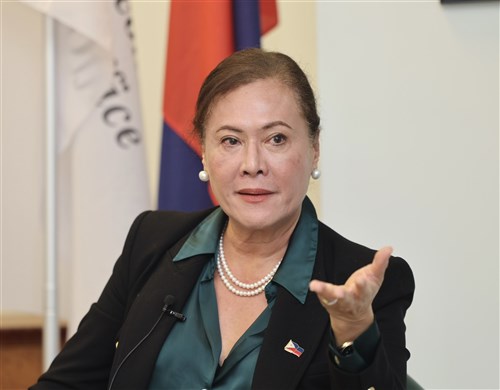INTERVIEW / 'Ghost Nation': A closer look at Taiwan beyond Beijing's shadow
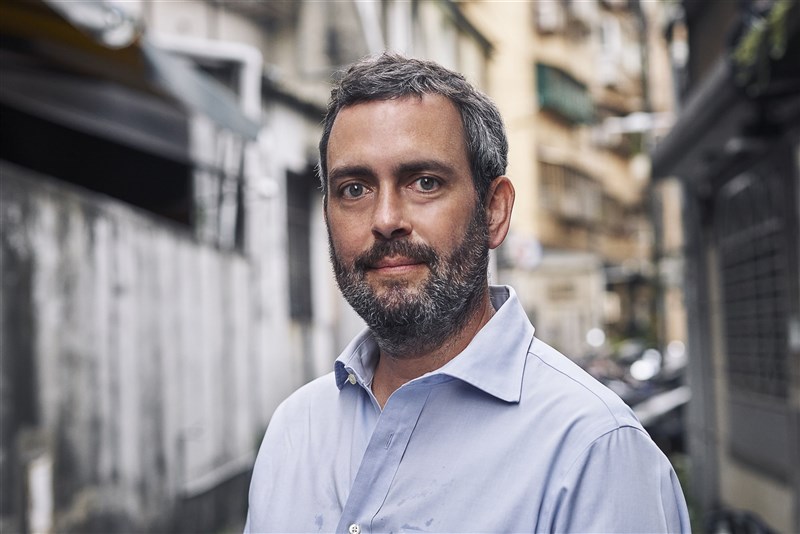
By Teng Pei-ju, CNA staff reporter
"We've been getting the CCP and the KMT version of Taiwan for forever," veteran American journalist Chris Horton asserts, harboring every intention to reject Beijing's territorial claims over Taiwan.
In his new book, "Ghost Nation: The Story of Taiwan and its Struggle for Survival," Horton is also critical of the Kuomintang (KMT), currently the largest opposition party in Taiwan, for its past authoritarian rule and current pro-Beijing stance.
Describing both the Chinese Communist Party (CCP) and the KMT as viewing Taiwanese as racially Chinese and favoring unification, Horton said his book aims to present Taiwan through a distinctly Taiwanese lens.
"I wanted to establish very quickly that Taiwan is not China and that it's a country," Horton, who relocated to Taiwan in 2015 after 15 years in China and Hong Kong, said about his approach to writing the book, published in mid-July.
"There are different regions and cities with their own personalities, and their own histories and stories," he said of Taiwan, casually drawing on knowledge of local quirks gleaned from a decade of reporting and self-guided biking tours around the island.
For the last 10 years in Taiwan, the 48-year-old journalist has primarily worked as a freelancer, contributing to the New York Times and other foreign news outlets, and serving briefly as a financial markets reporter for Bloomberg.
Tracing Taiwan's transformation
Written for a general international audience, "Ghost Nation" traces Taiwan's transformation over the past four centuries through the intertwined histories of politics, culture and society.
The book examines the evolution of Taiwan's national identity and institutions, highlighting why this history is crucial to understanding the country's precarious position in today's global geopolitics, particularly amid U.S.-China rivalry and Beijing's growing ambitions to annex Taiwan.
The book also revisits Taiwan's long pursuit of self-determination, stemming from the Japanese colonial period, when an educated segment of the population started demanding greater participation in the island's governance.
Such struggles over Taiwanese consciousness have persisted to this day, surviving the deadly crackdowns on islandwide protests against KMT rule in 1947 -- later known as the 228 Incident -- and the subsequent martial law era, during which the KMT maintained a reign of terror for nearly four decades.
It was not until 1987 that the KMT government lifted martial law in Taiwan, after years spent repressing pro-democracy movements that had emerged in the late 1970s.
Taiwan went on to hold its first direct presidential election in 1996.
When democracies look the other way
Today, Horton observed, Taiwan, a democracy with robust civil liberties and advanced technological development, is increasingly asserting its own voice on the global stage -- even as it faces mounting existential threats from China's military and political pressure.
However, he added, Beijing's intensified efforts to isolate Taiwan and undermine its sovereignty would not have gained ground without the acquiescence of other democracies.
He drew on his own experience to illustrate the point, recalling editors who explicitly instructed him never to refer to Taiwan as a country, a practice the former vice chairman of the Taiwan Foreign Correspondents' Club said was not uncommon in the industry.
In a business built on facts, the reporter added, Taiwan -- with a population comparable to Australia and a land area larger than Belgium -- is often reduced to "an island" to avoid upsetting Beijing.
Such "normalization of absurdity" has had an impact on Horton, who over the years has evolved from seeing Taiwan as a fallback option to becoming a vocal advocate for Taiwan's sovereignty.
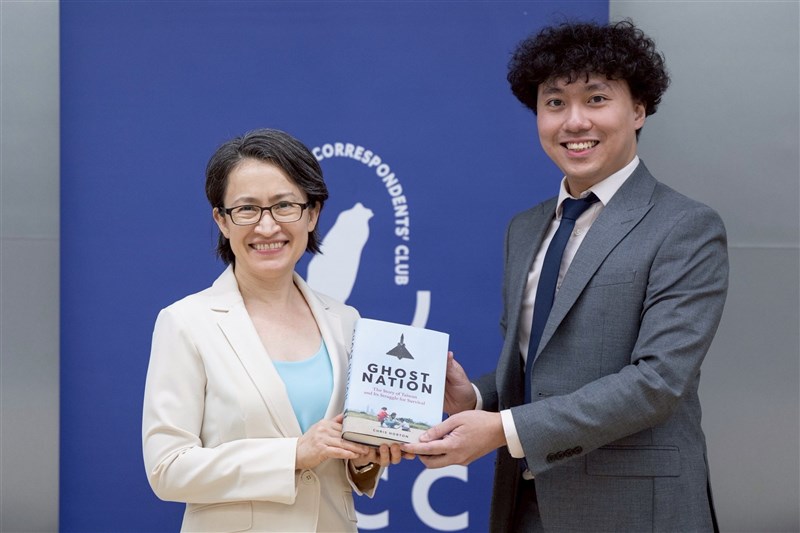
A nation in the shadows
Horton began writing "Ghost Nation" four years ago, tapping into interviews with prominent politicians and scholars in Taiwan and abroad, including former Presidents Lee Teng-hui (李登輝) and Tsai Ing-wen (蔡英文).
He linked the book title to Taiwan's international plight, likening the island to wandering spirits during Ghost Month -- a festival in Chinese-speaking societies when the dead are believed to roam among the living, yet remain shunned.
"Ghost Nation" is also inspired by the term guidao (鬼島), literally "ghost island," which was used derogatorily by a former KMT official in 2009 to describe Taiwan but later became widely adopted by the public as a term of endearment.
Horton said Taiwan rightfully deserved recognition as an independent sovereign state with its own seat at the United Nations.
Taiwan, officially the Republic of China, lost its U.N. seat in 1971 -- a seismic moment that triggered a wave of diplomatic breaks, including with Japan in 1972 and the United States in 1979.
The country is now left with just 12 diplomatic allies, after China lured away 10 of its partners over the past nine years under the Democratic Progressive Party government -- which Beijing opposes and labels as "pro-independence" forces.
"Taiwan shouldn't be a flashpoint; it should just be another member of the global community," Horton said. "The democratic world should step up for Taiwan."
Enditem/ASG
-
![Czech author reflects on cultural erasure under authoritarian rule]() Czech author reflects on cultural erasure under authoritarian ruleWhen best-selling Czech author Kateřina Tučková was in Taiwan earlier this month to promote the Chinese version of her novel "The Last Goddess," she said she felt the story would resonate with Taiwanese readers because of a common authoritarian past.02/22/2026 04:35 PM
Czech author reflects on cultural erasure under authoritarian ruleWhen best-selling Czech author Kateřina Tučková was in Taiwan earlier this month to promote the Chinese version of her novel "The Last Goddess," she said she felt the story would resonate with Taiwanese readers because of a common authoritarian past.02/22/2026 04:35 PM -
![Director Tsou Shih-ching challenges gender norms in 'Left-Handed Girl']() Director Tsou Shih-ching challenges gender norms in 'Left-Handed Girl'Superstitions passed down through generations can shape people's lives in subtle yet lasting ways. In her debut solo feature film "Left-Handed Girl" (左撇子女孩), director Tsou Shih-ching (鄒時擎) uses one such belief to examine gender roles and social expectations imposed on women in Taiwanese society.02/22/2026 11:04 AM
Director Tsou Shih-ching challenges gender norms in 'Left-Handed Girl'Superstitions passed down through generations can shape people's lives in subtle yet lasting ways. In her debut solo feature film "Left-Handed Girl" (左撇子女孩), director Tsou Shih-ching (鄒時擎) uses one such belief to examine gender roles and social expectations imposed on women in Taiwanese society.02/22/2026 11:04 AM -
![Philippines envoy urges crackdown on 'bad brokers,' backs direct hiring center plan]() Philippines envoy urges crackdown on 'bad brokers,' backs direct hiring center planThe Philippines' top envoy to Taiwan said authorities on both sides should crack down on unscrupulous brokers who overcharge migrant workers, and welcomed Taiwan's plan to open its first overseas direct recruitment center in Manila as a way to foster competition.02/17/2026 02:48 PM
Philippines envoy urges crackdown on 'bad brokers,' backs direct hiring center planThe Philippines' top envoy to Taiwan said authorities on both sides should crack down on unscrupulous brokers who overcharge migrant workers, and welcomed Taiwan's plan to open its first overseas direct recruitment center in Manila as a way to foster competition.02/17/2026 02:48 PM
-
Society
Taiwan releases forced labor prevention guide for businesses
02/24/2026 09:39 PM -
Politics
KMT to propose legislative oversight for advanced chip technology exports
02/24/2026 09:20 PM -
Society
Phone, text scam attempts fall 36.97% year-on-year in Taiwan
02/24/2026 09:07 PM -
Science & Tech
Google to launch budget Pixel 10a in Taiwan March 5
02/24/2026 08:55 PM -
Society
Free COVID vaccination extended to April 30 ahead of possible surge: CDC
02/24/2026 08:29 PM
